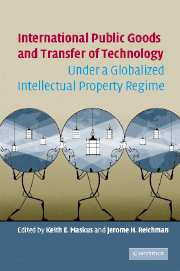Book contents
- Frontmatter
- Contents
- List of contributors
- Preface
- PART I International Provision of Public Goods under a Globalized Intellectual Property Regime
- PART II Innovation and Technology Transfer in a Protectionist Environment
- 8 Can the TRIPS Agreement Foster Technology Transfer to Developing Countries?
- Comment I: Technology Transfer on the International Agenda
- 9 Patent Rights and International Technology Transfer Through Direct Investment and Licensing
- Comment II: TRIPS and Technology Transfer – Evidence from Patent Data
- 10 Proprietary Rights and Collective Action: The Case of Biotechnology Research with Low Commercial Value
- 11 Do Stronger Patents Induce More Local Innovation?
- 12 Markets for Technology, Intellectual Property Rights, and Development
- 13 Using Liability Rules to Stimulate Local Innovation in Developing Countries: Application to Traditional Knowledge
- 14 Stimulating Agricultural Innovation
- PART III Sectoral Issues: Essential Medicines and Traditional Knowledge
- PART IV Reform and Regulation Issues
- Index
11 - Do Stronger Patents Induce More Local Innovation?
Published online by Cambridge University Press: 05 May 2010
- Frontmatter
- Contents
- List of contributors
- Preface
- PART I International Provision of Public Goods under a Globalized Intellectual Property Regime
- PART II Innovation and Technology Transfer in a Protectionist Environment
- 8 Can the TRIPS Agreement Foster Technology Transfer to Developing Countries?
- Comment I: Technology Transfer on the International Agenda
- 9 Patent Rights and International Technology Transfer Through Direct Investment and Licensing
- Comment II: TRIPS and Technology Transfer – Evidence from Patent Data
- 10 Proprietary Rights and Collective Action: The Case of Biotechnology Research with Low Commercial Value
- 11 Do Stronger Patents Induce More Local Innovation?
- 12 Markets for Technology, Intellectual Property Rights, and Development
- 13 Using Liability Rules to Stimulate Local Innovation in Developing Countries: Application to Traditional Knowledge
- 14 Stimulating Agricultural Innovation
- PART III Sectoral Issues: Essential Medicines and Traditional Knowledge
- PART IV Reform and Regulation Issues
- Index
Summary
ABSTRACT
One of the central arguments advanced by proponents of stronger intellectual property rights (IPRs) systems is that strengthening such systems induces higher levels of innovation by domestic firms. This article reviews several empirical studies undertaken by economists to assess the validity of this claim. Most studies fail to find evidence of a strong positive response by domestic innovators that could be reasonably ascribed to the effects of stronger IPRs. The benefits of stronger IPRs – to the extent that they exist at all – are more likely to come instead from an acceleration in the domestic deployment of advanced technology by the affiliates of foreign firms.
Introduction
Many contributors to this volume have noted the global trend towards strengthened intellectual property rights. Since strengthening its own patent system in the 1980s, through the establishment of the Federal Circuit Court of Appeals and through broadening the definition of what is patentable, the United States has been active in attempting to convince other nations to adopt stronger intellectual property rights (IPRs), and America's long campaign has achieved considerable success. Over the course of the 1980s and early 1990s, several nations were persuaded to enter into bilateral agreements with the United States. These agreements involved unilateral strengthening of the trading partners' intellectual property (IP) systems. Eventually, the United States was successful in its bid to incorporate the Agreement on Trade-Related Intellectual Property Rights (TRIPS) into the charter of the World Trade Organization (WTO).
- Type
- Chapter
- Information
- International Public Goods and Transfer of Technology Under a Globalized Intellectual Property Regime , pp. 307 - 320Publisher: Cambridge University PressPrint publication year: 2005
- 3
- Cited by



